rampant
Thursday, 31 January 2019
Homeopathy: a new study proves efficacy (according to Dana Ullman)
Read the rest here: Homeopathy: a new study proves efficacy (according to Dana Ullman)
American Loon #2138: Allen Quist
Read the full lunacy:
Wednesday, 30 January 2019
Live Blood Analysis revisited … but it turns out to still be bogus
Read the rest here: Live Blood Analysis revisited … but it turns out to still be bogus
Tuesday, 29 January 2019
Oscillococcinum: “If it’s made from a duck and quacks like a duck, it’s got to go”
Read the rest here: Oscillococcinum: “If it’s made from a duck and quacks like a duck, it’s got to go”
Monday, 28 January 2019
The AHRQ review of spinal manipulation for chronic back pain: more bad news for chiropractors
Read the rest here: The AHRQ review of spinal manipulation for chronic back pain: more bad news for chiropractors
Sunday, 27 January 2019
2019 SkS Weekly Climate Change & Global Warming Digest #4
Story of the Week... Editorial of the Week... Toon of the Week... Quote of the Week... SkS in the News... Coming Soon on SkS... Climate Feedback Reviews... SkS Week in Review... Poster of the Week...
Story of the Week...
Teenage activist takes School Strikes 4 Climate Action to Davos
Protest by 16-year-old Greta Thunberg snowballs to last day of World Economic Forum
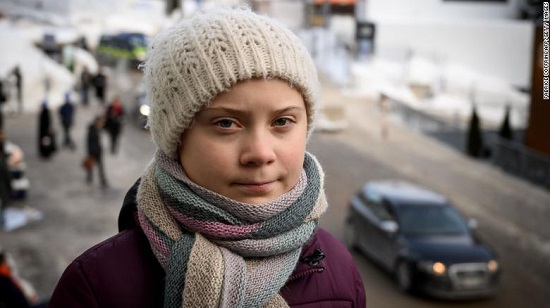
Swedish youth climate activist Greta Thunberg at the World Economic Forum in Davos, eastern Switzerland. Photograph: Fabrice Coffrini/AFP/Getty Images
The 16-year-old activist behind the fast-growing School Strikes 4 Climate Action has taken her campaign to the streets of Davos, to confront world leaders and business chiefs about the global emissions crisis.
Greta Thunberg, whose solo protest outside Sweden’s parliament has snowballed across the globe, will join a strike by Swiss schoolchildren in the ski resort on Friday – the final day of the World Economic Forum.
Thunberg travelled by train for 32 hours to reach Davos, and spent Wednesday night camped with climate scientists on the mountain slopes – where temperatures plunged to -18C.
Having already addressed the UN Climate Change COP 24 conference, Thunberg is rapidly becoming the voice for a generation who are demanding urgent action to slow the rise in global temperatures.
As she travelled down Davos’s funicular railway from the Arctic Base Camp – while more than 30,000 students were striking in Belgium - Thunberg said the rapid growth of her movement was “incredible”.
“There have been climate strikes, involving students and also adults, on every continent except Antarctica. It has involved tens of thousands of children.”
Teenage activist takes School Strikes 4 Climate Action to Davos by Graeme Wearden & Damian Carrington, Environment, Guardian, Jan 24, 2019
Editorial of the Week...
This Could Be The Biggest Scandal Of The Climate Change Era
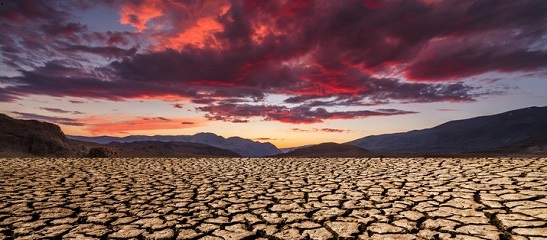
The world is headed for up to 5 degrees Celsius (9 F) of global warming above pre-industrial levels by 2100, which would lead to devastating consequences for billions of people. Credit: Anton Petrus via Getty Images
Governments and businesses habitually set out emergency response plans to protect their economies, jobs, cities and other crucial assets from potential disaster. Yet when it comes to climate change ― the biggest, most urgent threat the world faces ― there is no emergency plan.
On the issue of our lifetime, countries can agree very little. The World Economic Forum’s Global Risks Report 2019 published last Tuesday found that increasing divisions between the world’s major powers is the most urgent global risk we face because it stymies vital collective action on climate change.
Instead of action, we see delays, rejections and avoidance, as December’s United Nations climate summit in Katowice, Poland, so acutely reminded us. The event, which brought together world leaders, scientists, campaigners and the private sector, settled most of the rules needed to ensure countries follow the climate pledges they have made to date. What it failed to do is push countries to step up their targets for cutting greenhouse gas emissions ― currently the only viable way to prevent climate breakdown. The Middle East, the U.S. and Russia refused to even welcome landmark scientific predictions on climate change, signaling their intention to continue blocking progress.
This Could Be The Biggest Scandal Of The Climate Change Era, Opinion by Sandrine Dixson-Declève & Anders Wijkman, Huffington Post, Jan 23, 2019
Toon of the Week...
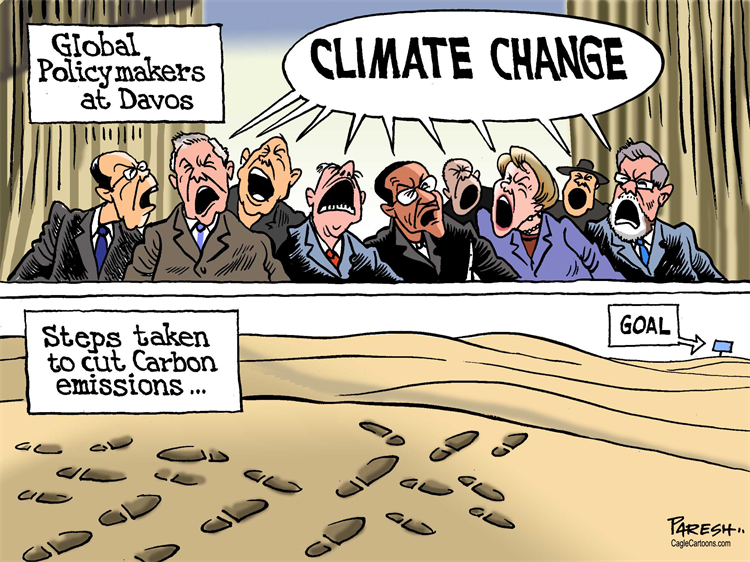
Hat tip to Stop Climate Denial Facebook page.
Quotes of the Week...
But the tone has shifted. The feeling is more dire. I don’t know what kids are supposed to do with the sobering fact that their planet is changing for the worse.
According to Laura Kastner, a clinical psychologist and professor in the psychology department and the department of psychiatry and behavioral sciences at the University of Washington, the way to teach kids about environmental issues is not by overwhelming them with data or presenting them with projected outcomes they can see no way of changing. It’s by being realistic with kids and also teaching them agency and action.
It’s what Kastner describes as the “both-and.” The idea of first acknowledging that, yes, climate change is happening, and there are things we can do to help. “We really are going to have to deal with this, and there is so much to do, so let’s get to work,” she said. “We want to be responsible and smart and informed about what’s happening, and we want to be hopeful and agentic.”
Heather Price, an atmospheric chemist, climate scientist and chemistry instructor at North Seattle College, who has presented climate science to members of Congress, says that whenever she gives a talk about rising temperatures, ocean acidification and mass extinctions, she always spends at least a quarter of her time discussing the areas where scientists see hope and how people are already altering the trajectory. For example, the capacity of renewable energy in the United Kingdom has surpassed that of fossil fuels for the first time, and in the United States, electric car sales were up 81 percent in 2018 over sales in 2017. Price knows the science is depressing. “But,” she says, “it’s not on the science side where the good things are happening. It’s on the mitigation, on the solutions.”
Ways to help kids cope with — and help combat — climate change by Ronit Feinglass Plank, Lifestyles, Washington Post, Jan 22, 2019
SkS in the News...
[To be added.]
Coming Soon on SkS...
[To be added.]
Climate Feedback Reviews...
How credible were 2018’s most popular climate articles?
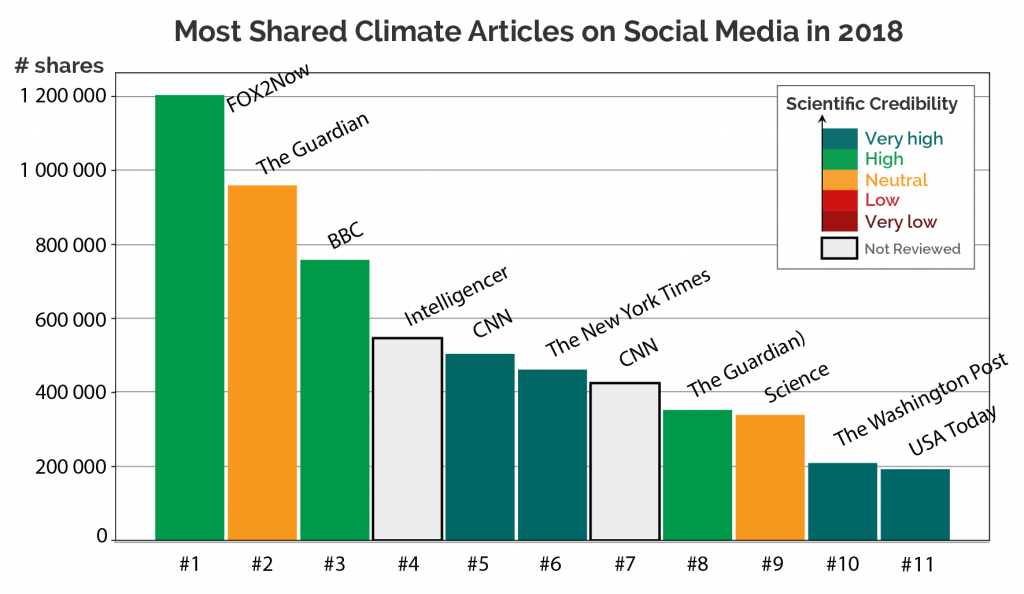
Summary
To investigate whether last year’s most “viral” climate change stories misled the people who read them, we asked scientists to evaluate a list of top articles (as we did last year). In November, we searched Buzzsumo for the climate articles[1] with the most shares and interactions—as many as 1.2 million in the top spot—selecting the top 10 that focused on verifiable statements about climate science. (One more story entered the list in December.) Two stories did not receive any reviews, but all the evaluations and comments we collected can be found below.
Compared to last year’s top 10, there is a notable lack of low credibility stories. Two stories garnered mixed reviews from scientists. In one case, this was an article detailing false claims about sea level rise made by politicians, in which some reviewers felt the article simply wasn’t clear enough in its corrections. But there were no articles from partisan outlets presenting inaccurate rejections of climate system at the top in 2018. Instead, the list was dominated by major news outlets—with the exception of the top story, which was published by the local FOX station in St. Louis.
This leads to an interesting question we unfortunately cannot answer at this stage: is this improvement in the credibility of the most-shared articles the result of recent changes to social media algorithms or just chance?
Almost half of the stories in this list cover major IPCC and US National Climate Assessment reports released last year. It also seems clear that people are interested in learning about (or commenting on) the environmental impacts of diet. The #4 story of 2017 was about the greenhouse gas emissions associated with beef production, and two of 2018’s top stories are on the same topic.
Several of the remaining stories featured dramatic headlines on events related to climate trends—things like winter warm spells at the North Pole or the 400th consecutive month warmer than the 20th century average. The most popular story (titled “NASA releases time-lapse of the disappearing Arctic polar ice cap”) was actually an article on the 2017 global surface temperature ranking that included a NASA animation of Arctic sea ice changes over the years.
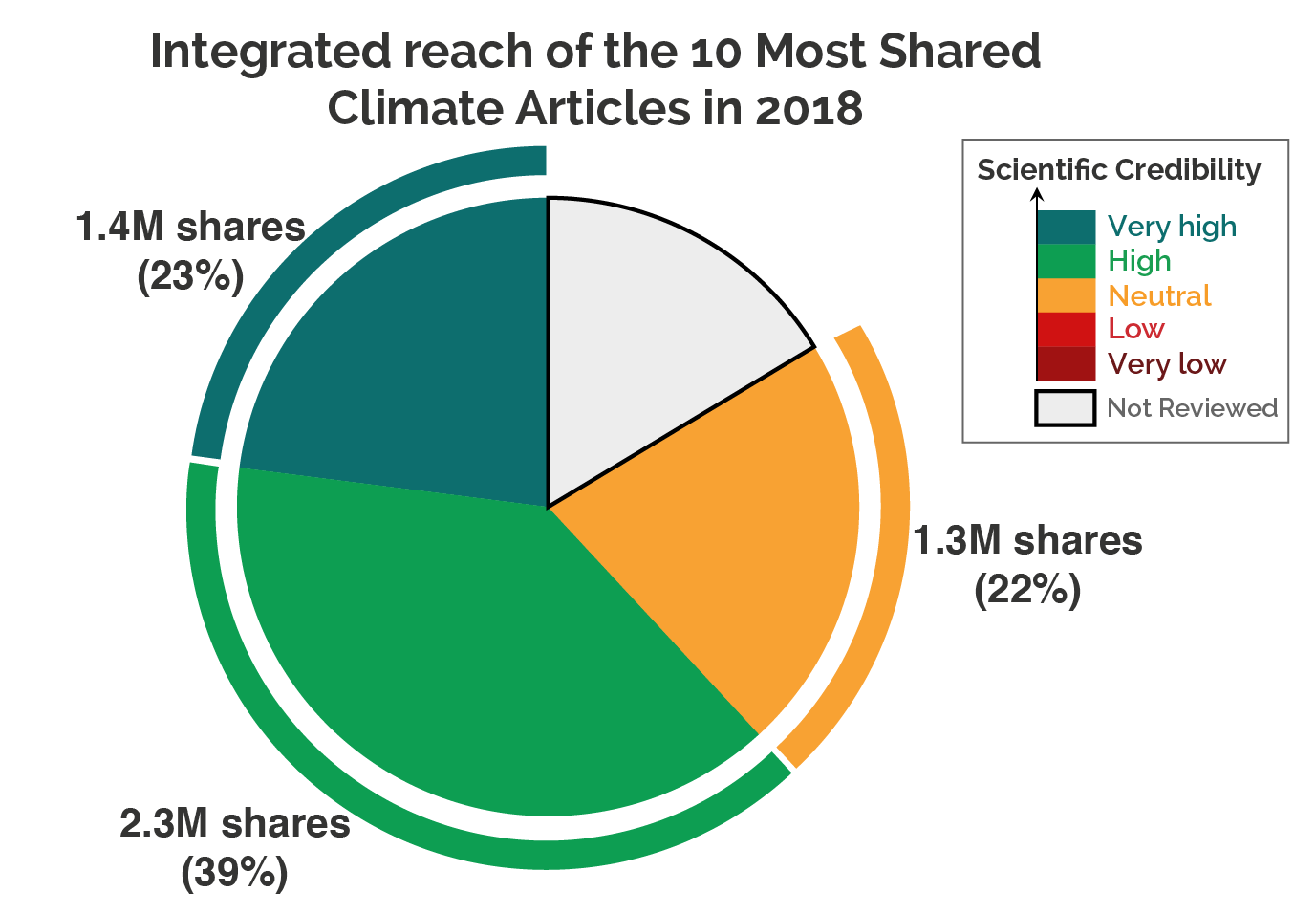
SkS Week in Review...
- 2019 SkS Weekly Climate Change & Global Warming News Roundup #4 by John Hartz
- New research, January 14-20, 2019 by Ari Jokimäki
- SkS Analogy 17 - Lotteries, evaporation, and superstorms by Evan & jg
- State of the climate: How the world warmed in 2018 by Zeke Hausfather, (Carbon Brief)
- 2019 SkS Weekly Climate Change & Global Warming Digest #3 by John Hartz
Poster of the Week...
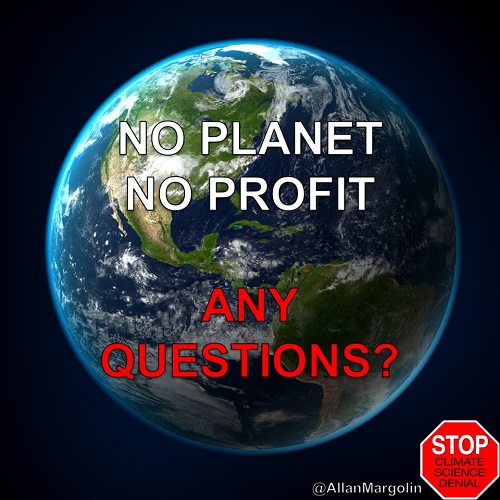
from Skeptical Science
via IFTTT
American Loon #2137: Janet Quinn
Read the full lunacy:
Saturday, 26 January 2019
Acupuncture is effective for chronic back pain!!! If you disagree, tell the CMS
Read the rest here: Acupuncture is effective for chronic back pain!!! If you disagree, tell the CMS
Friday, 25 January 2019
Integrative medicine for coronary artery disease works – provided your trial is fatally flawed
Read the rest here: Integrative medicine for coronary artery disease works – provided your trial is fatally flawed
Thursday, 24 January 2019
American Loon #2136: Greg Quinlan
Read the full lunacy:
Does acupuncture reduce the risk of cardiovascular disease? Yes, that would be nice, but I fear the answer is no!
Read the rest here: Does acupuncture reduce the risk of cardiovascular disease? Yes, that would be nice, but I fear the answer is no!
Wednesday, 23 January 2019
Healing Cancer: A Homoeopathic Approach
Read the rest here: Healing Cancer: A Homoeopathic Approach
Tuesday, 22 January 2019
American Loon #2135: Hal Puthoff
Read the full lunacy:
‘Users of homeopathic medicines can no longer remain silent’
Read the rest here: ‘Users of homeopathic medicines can no longer remain silent’
Monday, 21 January 2019
Are cervical manipulations for neck pain truly ‘much safer than the use of NSAIDs’?
Read the rest here: Are cervical manipulations for neck pain truly ‘much safer than the use of NSAIDs’?
2019 SkS Weekly Climate Change & Global Warming Digest #3
Story of the Week... Analysis of the Week... Toon of the Week... SkS in the News... Coming Soon on SkS... Climate Feedback Reviews... SkS Week in Review... Poster of the Week...
Story of the Week...
Climate Forecast: World Is “Sleepwalking into Catastrophe”
In an annual World Economic Forum report, climate change, extreme weather and biodiversity loss were named among the highest global risks
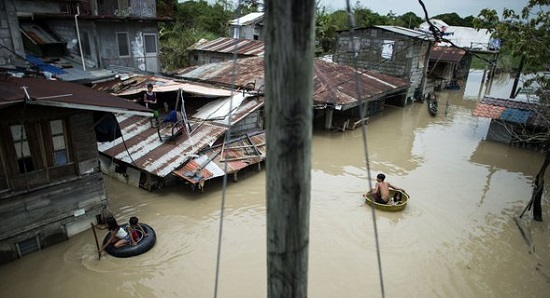
Children use basins to cross a flooded street in the aftermath of Typhoon Mangkhut in Calumpit, Philippines on September 16, 2018. Credit: Noel Celis Getty Images
Climate change is the biggest threat to the planet, the World Economic Forum said yesterday in a sweeping catalog of global risks.
The institution’s annual analysis of economic dangers worldwide named extreme weather, natural disasters, man-made environmental disasters, biodiversity loss and failure to adapt to climate change as the chief perils to society.
Of all the risks to the globe, “it is in relation to the environment that the world is most clearly sleepwalking into catastrophe,” the WEF said in its Global Risks Report. “The results of climate inaction are becoming increasingly clear.”
Climate Forecast: World Is “Sleepwalking into Catastrophe” by Anne C Mulkern, E&E News/Scientific American, Jan 17, 2019
Analysis of the Week...
Climate Change’s Giant Impact on the Economy: 4 Key Issues
Many of the big economic questions in coming decades will come down to just how extreme the weather will be, and how to value the future versus the present.
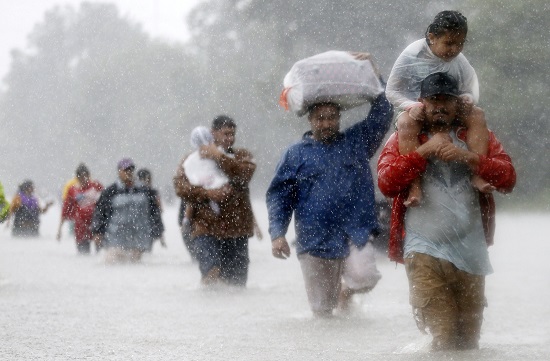
Wading through flood waters from Tropical Storm Harvey in Houston in August 2017. “We know we can adapt to slow changes,” a Yale economist said. “Rapid changes are the ones that would be most damaging and painful.” Credit: Jonathan Bachman/Reuters
By now, it’s clear that climate change poses environmental risks beyond anything seen in the modern age. But we’re only starting to come to grips with the potential economic effects.
Using increasingly sophisticated modeling, researchers are calculating how each tenth of a degree of global warming is likely to play out in economic terms. Their projections carry large bands of uncertainty, because of the vagaries of human behavior and the remaining questions about how quickly the planet will respond to the buildup of greenhouse gases.
A government report in November raised the prospect that a warmer planet could mean a big hit to G.D.P. in the coming decades.
And on Thursday, some of the world’s most influential economists called for a tax on carbon emissions in the United States, saying climate change demands “immediate national action.” The last four people to lead the Federal Reserve, 15 former leaders of the White House Council of Economic Advisers, and 27 Nobel laureates signed a letter endorsing a gradually rising carbon tax whose proceeds would be distributed to consumers as “carbon dividends.”
The Trump administration has long rejected prescriptions like a carbon tax. But policy debates aside, many of the central economic questions of the decades ahead are, at their core, going to be climate questions. These are some of the big ones.
Climate Change ’s Giant Impact on the Economy: 4 Key Issues by Neil Irwin, Upshot, New York Times, Jan 17, 2019
Toon of the Week...
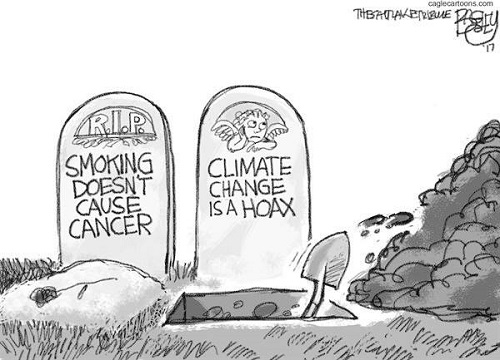
Hat tip to Stop Climate Science Denial Facebook page.
SkS in the News...
The second part of Graham Readfearn's article, Climate Advocates Underestimate Power of Fossil Fueled Misinformation Campaigns, Say Top Researchers (DeSmog, Jan 18, 2019) focuses on Inoculation. It begins with:
In addition, the researchers suggest using an emerging communications technique known as “inoculation” in which the public and policymakers are made aware of key misinformation techniques as myths are being busted.
The link embedded in the above is to the article, Inoculation Theory: Using Misinformation to Fight Misinformation by John Cook (DeSmog, July 15, 2017).
Coming Soon on SkS...
[To be added.]
Climate Feedback Reviews...
USA Today story updates readers on trend in monthly global temperatures
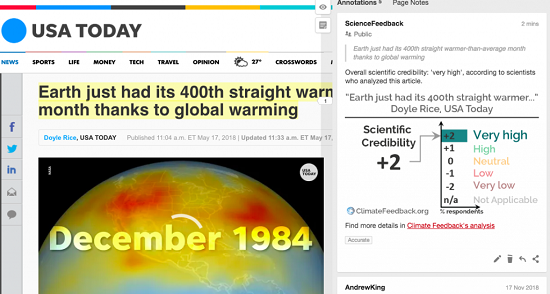
Climate Feedback asked a team of scientists to review the article, Earth just had its 400th straight warmer-than-average month thanks to global warming by Doyle Rice, USA Today, May 17, 2018
Review Summary
This article in USA Today notes that April 2018 was the 400th straight month that global temperatures were above the 20th century average, and correctly identifies human activities as the cause of this trend. It also highlights several regions that saw record-high April temperatures.
Scientists who reviewed the article found that it accurately described these facts and clearly explained how above-average months are calculated.
This is part of a series of reviews of 2018’s most popular climate stories on social media.
USA Today story updates readers on trend in monthly global temperatures by Scott Johnson, climate Feedback, Jan 14, 2019
SkS Week in Review...
- 2019 SkS Weekly Climate Change & Global Warming News Roundup #3 by John Hartz
- New research, January 7-13, 2019 by Ari Jokimäki
- Our oceans broke heat records in 2018 and the consequences are catastrophic by John Abraham (Climate Consensus - the 97%, Environment, Guardian)
- Book Review: Saudi America by gws
- New findings on ocean warming: 5 questions answered by Scott Denning (The Conversation US)
- Observations and models agree that the oceans are warming faster by Zeke Hausfather (Carbon Brief)
- 2019 SkS Weekly Climate Change & Global Warming Digest #2 by John Hartz
Poster of the Week...
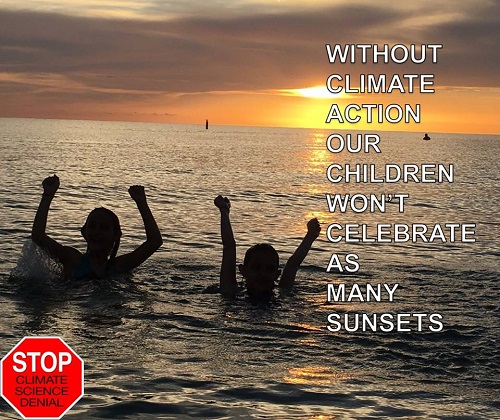
from Skeptical Science
via IFTTT
Sunday, 20 January 2019
Violinist Schools Us on Vaccines (Hilarity Ensues)
Read more at: Violinist Schools Us on Vaccines (Hilarity Ensues) by Reuben
A new, imaginative and ‘semenly’ effective SCAM for back pain
Read the rest here: A new, imaginative and ‘semenly’ effective SCAM for back pain
American Loon #2134: Kevin Purfield
Read the full lunacy:
Saturday, 19 January 2019
The ‘Institute for Scientific Homeopathy’ and ‘the most stupid idea conceivable’
Read the rest here: The ‘Institute for Scientific Homeopathy’ and ‘the most stupid idea conceivable’
Friday, 18 January 2019
‘Chiropractic Substracts Years From Your Life’ (?$?$?)
Read the rest here: ‘Chiropractic Substracts Years From Your Life’ (?$?$?)
Thursday, 17 January 2019
The ‘Dunning Kruger Effect’ in action
Read the rest here: The ‘Dunning Kruger Effect’ in action
American Loon #2133: Fred Pulver
Read the full lunacy:
Wednesday, 16 January 2019
Is chiropractic proven effective for a long list of conditions? No, I really don’t think so
Read the rest here: Is chiropractic proven effective for a long list of conditions? No, I really don’t think so
Tuesday, 15 January 2019
American Loon #2132: Ana Puig
Read the full lunacy:
Probiotics are NOT entirely risk-free
Read the rest here: Probiotics are NOT entirely risk-free
Monday, 14 January 2019
Severe adverse effects of chiropractic in children
Read the rest here: Severe adverse effects of chiropractic in children
Sunday, 13 January 2019
2019 SkS Weekly Climate Change & Global Warming Digest #2
Story of the Week... Analysis of the Week... Toon of the Week... Coming Soon on SkS... Poster of the Week... SkS Week in Review...
Story of the Week...
Once derided, ways of adapting to climate change are gaining steam
Recognition is spreading that communities need to build resilience to climatic and coastal threats even as the world seeks ways to curb emissions driving global warming.
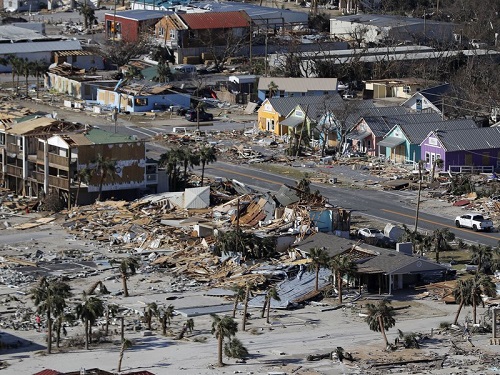
Mexico Beach, Florida in aftermath of Hurricane Michael
From chronically flooded Midwestern towns to fire-charred California suburbs, from Bangladesh’s sodden delta to low island nations facing rising seas, a long-underplayed strategy for cutting risks related to human-driven climate change is coming to the fore—adaptation.
Through 30 years of efforts to limit global warming, the dominant goal was cutting emissions of heat-trapping gases, most importantly carbon dioxide from burning fossil fuels. Efforts to adapt communities or agriculture to warming and the related rise in seas and other impacts were often seen as a copout.
The spotty nature of adaptation efforts so far can be seen in the aftermath of Hurricane Michael—where one reinforced, raised home famously survived, nearly alone, along Mexico Beach, Florida, after the strongest Panhandle hurricane in at least 155 years. In the Camp Fire that devastated Paradise, California, and killed 85 people, a sprinkling of houses built and maintained to withstand embers survived, but—again—were the rare exception.
But signs are emerging that a significant shift is under way, dividing the climate challenge into two related, but distinct, priorities: working to curb greenhouse gases to limit odds of worst-case outcomes later this century while boosting resilience to current and anticipated climatic and coastal hazards with just as much fervor. There’s action from the top down, and—perhaps more significant in the long run—from the bottom up.
Once derided, ways of adapting to climate change are gaining steam by Andrew Revkin, Environment, National Geographic, Jan 10, 2019
Analysis of the Week...
How the fossil fuel industry got the media to think climate change was debatable
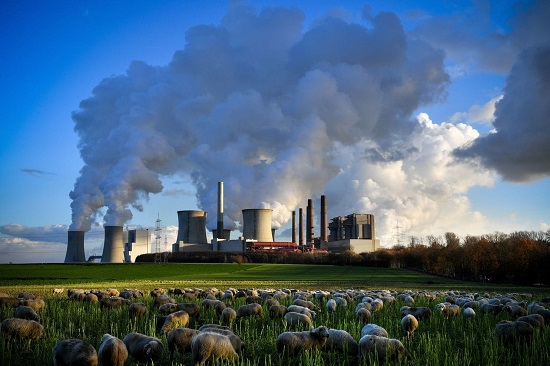
A brown-coal-fired power plant in Bergheim, Germany. (Sascha Steinbach/EPA-EFE/REX)
Late last year, the Trump administration released the latest national climate assessment on Black Friday in what many assumed was an attempt to bury the document. If that was the plan, it backfired, and the assessment wound up earning more coverage than it probably would have otherwise. But much of that coverage perpetuated a decades-old practice, one that has been weaponized by the fossil fuel industry: false equivalence.
Although various business interests began pushing back against environmental action in general in the early 1970s as part of the conservative “war of ideas” launched in response to the social movements of the 1960s, when global warming first broke into the public sphere, it was a bipartisan issue and remained so for years. On the campaign trail in 1988, George H.W. Bush identified as an environmentalist and called for action on global warming, framing it as a technological challenge that American innovation could address. But fossil fuel interests were shifting as the industry and its allies began to push back against empirical evidence of climate change, taking many conservatives along with them.
Documents uncovered by journalists and activists over the past decade lay out a clear strategy: First, target media outlets to get them to report more on the “uncertainties” in climate science, and position industry-backed contrarian scientists as expert sources for media. Second, target conservatives with the message that climate change is a liberal hoax, and paint anyone who takes the issue seriously as “out of touch with reality.”In the 1990s, oil companies, fossil fuel industry trade groups and their respective PR firms began positioning contrarian scientists such as Willie Soon, William Happer and David Legates as experts whose opinions on climate change should be considered equal and opposite to that of climate scientists. The Heartland Institute, which hosts an annual International Conference on Climate Change known as the leading climate skeptics conference, for example, routinely calls out media outlets (including The Washington Post) for showing “bias” in covering climate change when they either decline to quote a skeptic or question a skeptic’s credibility.
How the fossil fuel industry got the media to think climate change was debatable by Amy Westervelt, Post Everything, Washington Post, Jan 10, 2019
Toon of the Week...
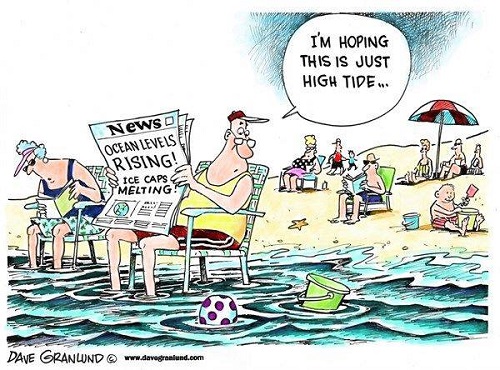
Coming Soon on SkS...
- Observations and models agree that the oceans are warming faster (Cheng et al.)
- New findings on ocean warming: 5 questions answered (Scott Denning)
- Book review: Saudi America (gws)
- SkS Analogy 17 - Lotteries, evaporation, and superstorms (Evan)
- New research this week (Ari)
- 2019 SkS Weekly Climate Change & Global Warming News Roundup #3 (John Hartz)
- 2019 SkS Weekly Climate Change & Global Warming Digest #3 (John Hartz)
Poster of the Week...
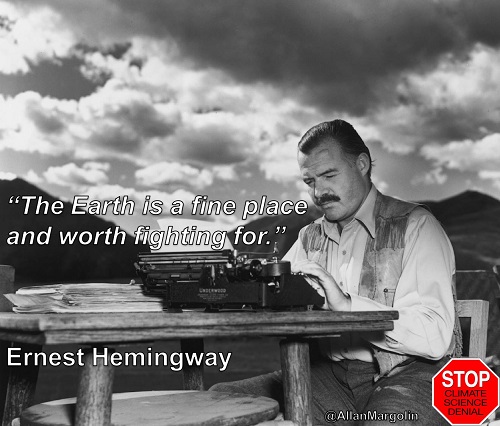
SkS Week in Review...
- 2019 SkS Weekly Climate Change & Global Warming News Roundup #2 by John Hartz
- New research, January 1-6, 2019 by Ari Jokimäki
- Climate negotiations made me terrified for our future, Climate Adam (YouTube Video)
- Republicans call for 'innovation' to tackle climate change, but it's not magic by Dana Nuccitelli (Yale Climate Connections)
- Skeptical Science takes the Pro-Truth-Pledge by BaerbelW & John Cook
- 2019 SkS Weekly Climate Change & Global Warming Digest #1 by John Hartz
from Skeptical Science
via IFTTT
American Loon #2131: Cindy Pugh
Read the full lunacy:
Saturday, 12 January 2019
When homeopaths start lecturing us on EBM, hilarity is never far
Read the rest here: When homeopaths start lecturing us on EBM, hilarity is never far
Friday, 11 January 2019
Massage: one of the few alternative treatments that is supported by fairly sound evidence
Read the rest here: Massage: one of the few alternative treatments that is supported by fairly sound evidence
American Loon #2130: Scott Pruitt
Read the full lunacy:
Thursday, 10 January 2019
American Loon #2129: Matt Pruitt
Read the full lunacy:
Chiropractic education … evidence-based? … No, wait…
Read the rest here: Chiropractic education … evidence-based? … No, wait…
Wednesday, 9 January 2019
Gangrene is the death of the patient treated purely with homeopathy.
Read the rest here: Gangrene is the death of the patient treated purely with homeopathy.
Tuesday, 8 January 2019
American Loon #2128: Alan Pressman
Read the full lunacy:
A review of “A New Year’s Message” from NCCIH’s Director: Helene Langevin M.D. January 2019.
Read the rest here: A review of “A New Year’s Message” from NCCIH’s Director: Helene Langevin M.D. January 2019.
Monday, 7 January 2019
Non-surgical Treatments for Lumbar Spinal Stenosis? How to make even a useless therapy appear to be effective
Read the rest here: Non-surgical Treatments for Lumbar Spinal Stenosis? How to make even a useless therapy appear to be effective
2019 SkS Weekly Climate Change & Global Warming Digest #1
Story of the Week... Editorial of the Week... Toon of the Week... Coming Soon on SkS... Poster of the Week... SkS Week in Review...
Story of the Week...
Katharine Hayhoe: 'A thermometer is not liberal or conservative'
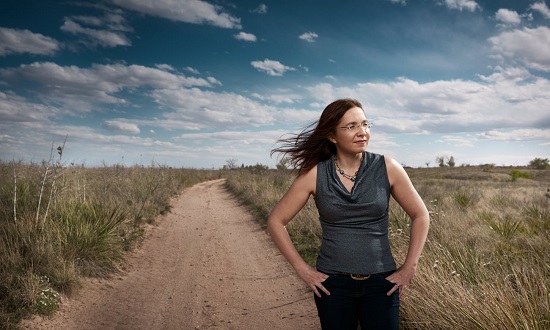
Katharine Hayhoe: ‘Fear is a short-term spur to action, but to make changes over the long term, we must have hope.’ Photograph: Randal Ford
The award-winning atmospheric scientist on the urgency of the climate crisis and why people are her biggest hope.
Katharine Hayhoe is an atmospheric scientist and director of the Climate Science Center at Texas Tech University. She has contributed to more than 125 scientific papers and won numerous prizes for her science communication work. In 2018 she was a contributor to the US National Climate Assessment and was awarded the Stephen H Schneider award for outstanding climate science communication.
In 2018, we have seen forest fires in the Arctic circle; record high temperatures in parts of Australia, Africa and the US; floods in India; and devastating droughts in South Africa and Argentina. Is this a turning point?
This year has hit home how climate change loads the dice against us by taking naturally occurring weather events and amplifying them. We now have attribution studies that show how much more likely or stronger extreme weather events have become as a result of human emissions. For example, wildfires in the western US now burn nearly twice the area they would without climate change, and almost 40% more rain fell during Hurricane Harvey than would have otherwise. So we are really feeling the impacts and know how much humanity is responsible.
Katharine Hayhoe: 'A thermometer is not liberal or conservative', Interview by Jonathan Watts, Science, The Observer/Guardian, Jan 6, 2019
Editorial of the Week...
Hope for a Green New Year
Democrats can’t pass legislation yet, but they can get ready for 2021.
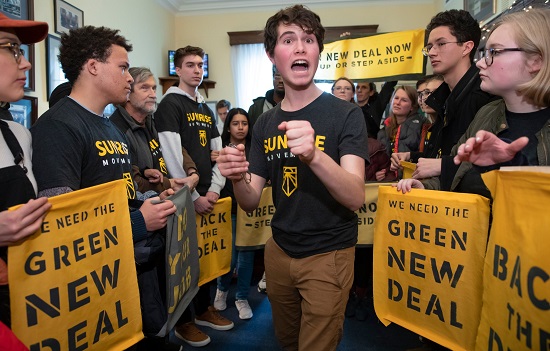
Supporters of the Green New Deal made their voices heard on Capitol Hill in December. Credit: Scott Applewhite/Associated Press
Let’s be honest with ourselves: The new Democratic majority in the House won’t be able to enact new legislation. I’ll be astonished if there are bipartisan deals on anything important — even on infrastructure, where both sides claim to want action but what the G.O.P. really wants is an excuse to privatize public assets.
So the immediate consequences of the power shift in Washington won’t involve actual policymaking; they’ll come mainly from Democrats’ new, subpoena-power-armed ability to investigate the fetid swamp of Trumpian corruption.
But that doesn’t mean that Democrats should ignore policy issues. On the contrary, the party should spend the next two years figuring out what, exactly, it will try to do if it gains policymaking power in 2021. Which brings me to the big policy slogan of the moment: the so-called Green New Deal. Is this actually a good idea?
Hope for a Green New Year, Opinion by Paul Krugman, New York Times, Dec 31, 2018
Toon of the Week...
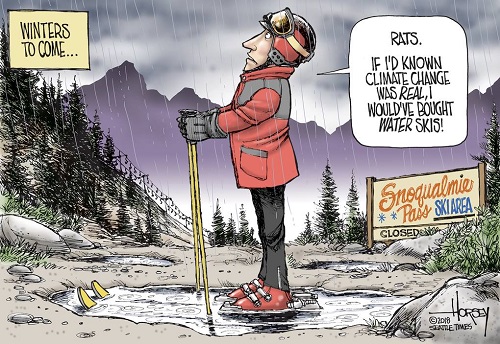
Hat tip to Stop Climate Science Denial Facebook page.
Coming Soon on SkS...
- Skeptical Science takes the pro-truth pledge (Baerbel, John Cook)
- New findings on ocean warming: 5 questions answered (Scott Denning)
- Climate negotiations made me terrified for our future (Climate Adam)
- New ocean heat content research (John Abraham)
- New research this week (Ari)
- 2019 SkS Weekly Climate Change & Global Warming News Roundup #2 (John Hartz)
- 2019 SkS Weekly Climate Change & Global Warming Digest #2 (John Hartz)
Poster of the Week...
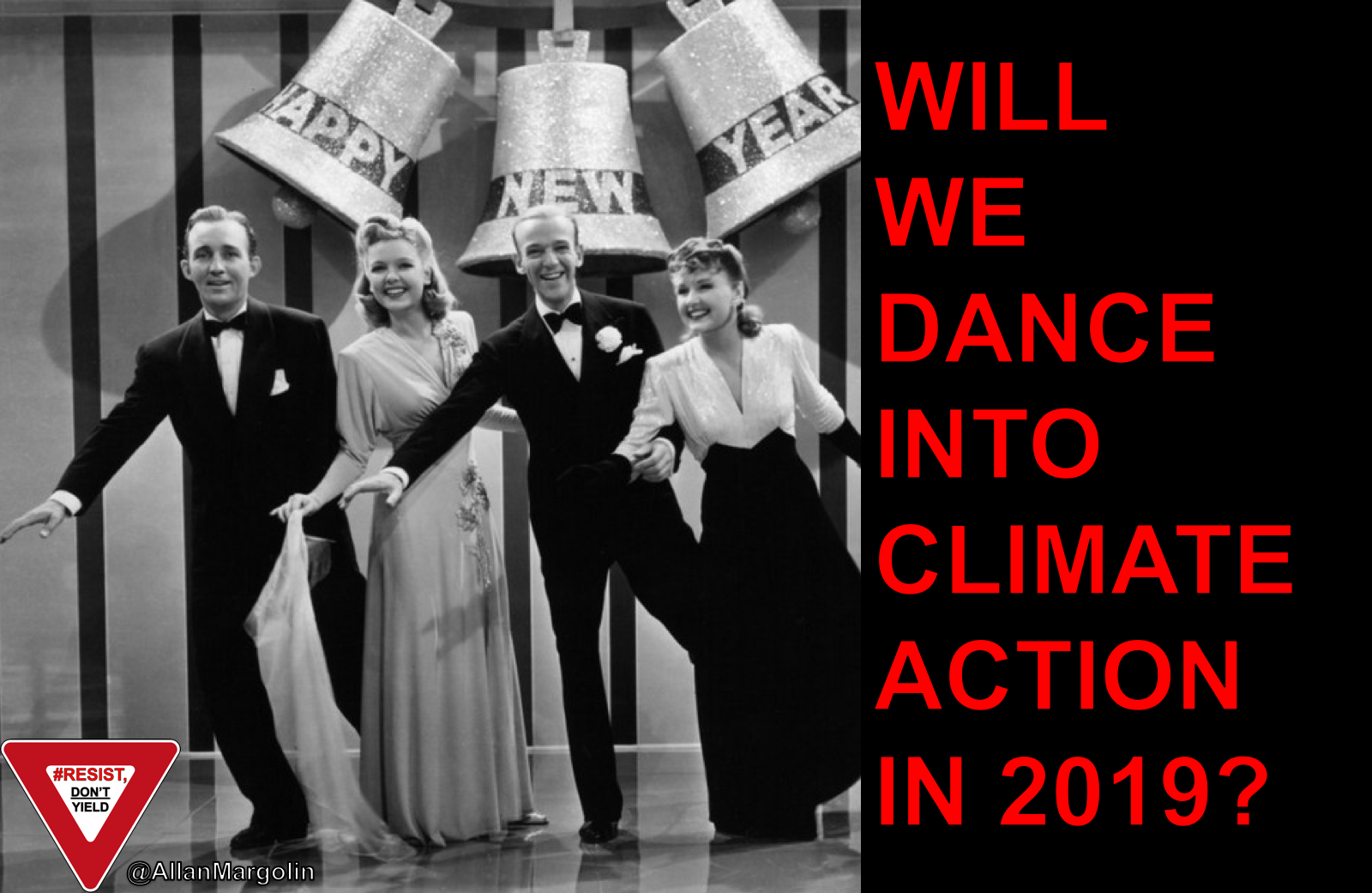
SkS Week in Review...
- 2019 SkS Weekly Climate Change & Global Warming News Roundup #1 by John Hartz
- New research, December 24-31, 2018 by Ari Jokimäki
- Portuguese Translation of The Debunking Handbook by BaerbelW
- 2018 in Review: a recap of the Skeptical Science year by BaerbelW
- 2018 SkS Weekly Climate Change & Global Warming Digest #52 by John Hartz
from Skeptical Science
via IFTTT
Sunday, 6 January 2019
American Loon #2127: Michele Presnell
Read the full lunacy:
Saturday, 5 January 2019
Homeopathy for benign prostate hypertrophy (BPH)? No, afraid not!
Read the rest here: Homeopathy for benign prostate hypertrophy (BPH)? No, afraid not!
Friday, 4 January 2019
American Loon #2126: Burt Prelutsky
Read the full lunacy:
Acupressure for post-operative pain-control? There are good reasons to be sceptical!
Read the rest here: Acupressure for post-operative pain-control? There are good reasons to be sceptical!
Thursday, 3 January 2019
Intravenous quackery anyone?
Read the rest here: Intravenous quackery anyone?
Wednesday, 2 January 2019
Unproven medicines a risk to health and wallet
Read the rest here: Unproven medicines a risk to health and wallet
American Loon #2125: Bobby Powell
Read the full lunacy:
Tuesday, 1 January 2019
Any fine resolutions for 2019?
Read the rest here: Any fine resolutions for 2019?